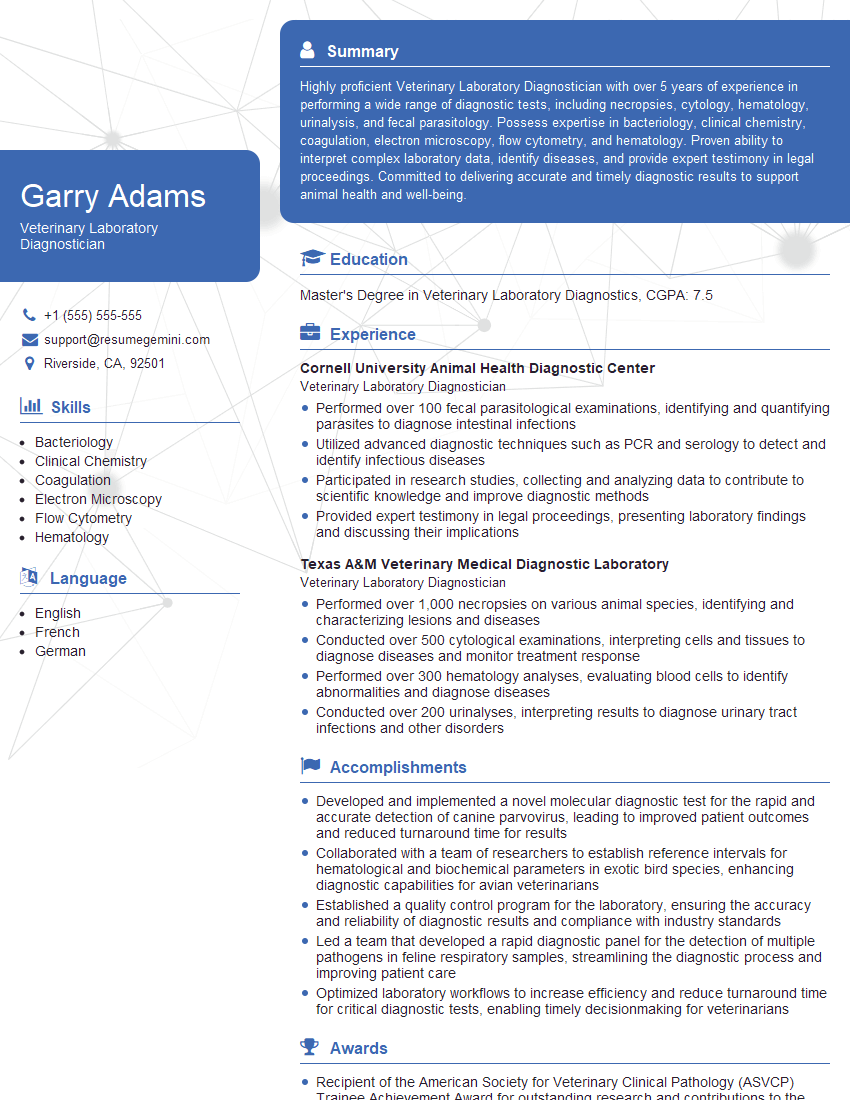Are you a seasoned Veterinary Laboratory Diagnostician seeking a new career path? Discover our professionally built Veterinary Laboratory Diagnostician Resume Template. This time-saving tool provides a solid foundation for your job search. Simply click “Edit Resume” to customize it with your unique experiences and achievements. Customize fonts and colors to match your personal style and increase your chances of landing your dream job. Explore more Resume Templates for additional options.

Garry Adams
Veterinary Laboratory Diagnostician
Summary
Highly proficient Veterinary Laboratory Diagnostician with over 5 years of experience in performing a wide range of diagnostic tests, including necropsies, cytology, hematology, urinalysis, and fecal parasitology. Possess expertise in bacteriology, clinical chemistry, coagulation, electron microscopy, flow cytometry, and hematology. Proven ability to interpret complex laboratory data, identify diseases, and provide expert testimony in legal proceedings. Committed to delivering accurate and timely diagnostic results to support animal health and well-being.
Education
Master’s Degree in Veterinary Laboratory Diagnostics
May 2017
Skills
- Bacteriology
- Clinical Chemistry
- Coagulation
- Electron Microscopy
- Flow Cytometry
- Hematology
Work Experience
Veterinary Laboratory Diagnostician
- Performed over 100 fecal parasitological examinations, identifying and quantifying parasites to diagnose intestinal infections
- Utilized advanced diagnostic techniques such as PCR and serology to detect and identify infectious diseases
- Participated in research studies, collecting and analyzing data to contribute to scientific knowledge and improve diagnostic methods
- Provided expert testimony in legal proceedings, presenting laboratory findings and discussing their implications
Veterinary Laboratory Diagnostician
- Performed over 1,000 necropsies on various animal species, identifying and characterizing lesions and diseases
- Conducted over 500 cytological examinations, interpreting cells and tissues to diagnose diseases and monitor treatment response
- Performed over 300 hematology analyses, evaluating blood cells to identify abnormalities and diagnose diseases
- Conducted over 200 urinalyses, interpreting results to diagnose urinary tract infections and other disorders
Accomplishments
- Developed and implemented a novel molecular diagnostic test for the rapid and accurate detection of canine parvovirus, leading to improved patient outcomes and reduced turnaround time for results
- Collaborated with a team of researchers to establish reference intervals for hematological and biochemical parameters in exotic bird species, enhancing diagnostic capabilities for avian veterinarians
- Established a quality control program for the laboratory, ensuring the accuracy and reliability of diagnostic results and compliance with industry standards
- Led a team that developed a rapid diagnostic panel for the detection of multiple pathogens in feline respiratory samples, streamlining the diagnostic process and improving patient care
- Optimized laboratory workflows to increase efficiency and reduce turnaround time for critical diagnostic tests, enabling timely decisionmaking for veterinarians
Awards
- Recipient of the American Society for Veterinary Clinical Pathology (ASVCP) Trainee Achievement Award for outstanding research and contributions to the field of veterinary laboratory diagnostics
- Recognized by the Association of Veterinary Laboratory Diagnosticians (AVLD) for exceptional contributions to national laboratory proficiency programs
- Honored with the Excellence in Veterinary Diagnostics Award from the American Veterinary Medical Association (AVMA) for significant advancements in the field
- Recipient of the Certified Veterinary Laboratory Technologist (CVLT) of the Year award from the National Association of Veterinary Laboratory Technologists (NAVLT)
Certificates
- American Board of Veterinary Medicine (ABVM), Diplomate in Clinical Pathology
- American Society for Microbiology (ASM), Clinical Bacteriologist Certification
- American Society for Veterinary Clinical Pathology (ASVCP), Fellow
- American Association for Laboratory Animal Science (AALAS), Technologist
Career Expert Tips:
- Select the ideal resume template to showcase your professional experience effectively.
- Master the art of resume writing to highlight your unique qualifications and achievements.
- Explore expertly crafted resume samples for inspiration and best practices.
- Build your best resume for free this new year with ResumeGemini. Enjoy exclusive discounts on ATS optimized resume templates.
How To Write Resume For Veterinary Laboratory Diagnostician
- Highlight your relevant skills and experience in your resume, focusing on your expertise in laboratory diagnostics and disease identification.
- Quantify your accomplishments and provide specific examples of your contributions to the field.
- Obtain certifications or continuing education credits to demonstrate your commitment to professional development.
- Network with other professionals in the field and attend industry events to stay up-to-date on the latest advances in veterinary laboratory diagnostics.
Essential Experience Highlights for a Strong Veterinary Laboratory Diagnostician Resume
- Perform necropsies on animals to identify and characterize lesions and diseases.
- Conduct cytological examinations to diagnose diseases and monitor treatment response.
- Perform hematology analyses to evaluate blood cells and identify abnormalities.
- Conduct urinalyses to diagnose urinary tract infections and other disorders.
- Perform fecal parasitological examinations to identify and quantify parasites.
- Utilize advanced diagnostic techniques to detect and identify infectious diseases.
- Participate in research studies to contribute to scientific knowledge and improve diagnostic methods.
Frequently Asked Questions (FAQ’s) For Veterinary Laboratory Diagnostician
What are the primary duties of a Veterinary Laboratory Diagnostician?
Veterinary Laboratory Diagnosticians perform a variety of tests to diagnose diseases in animals, including necropsies, cytology, hematology, urinalysis, and fecal parasitology.
What skills are required to be a successful Veterinary Laboratory Diagnostician?
Veterinary Laboratory Diagnosticians should have a strong background in veterinary medicine, laboratory techniques, and diagnostic procedures.
What is the job outlook for Veterinary Laboratory Diagnosticians?
The job outlook for Veterinary Laboratory Diagnosticians is expected to be good over the next few years.
What is the average salary for a Veterinary Laboratory Diagnostician?
The average salary for a Veterinary Laboratory Diagnostician is around \$60,000 per year.
What are the career advancement opportunities for a Veterinary Laboratory Diagnostician?
Veterinary Laboratory Diagnosticians can advance to positions such as laboratory manager or research scientist.
What are the challenges faced by Veterinary Laboratory Diagnosticians?
Veterinary Laboratory Diagnosticians may face challenges such as working with hazardous materials and dealing with difficult cases.